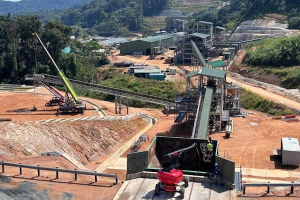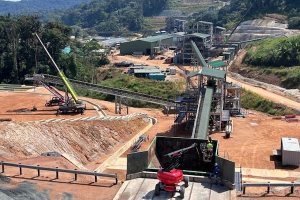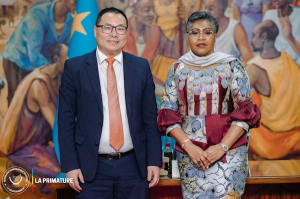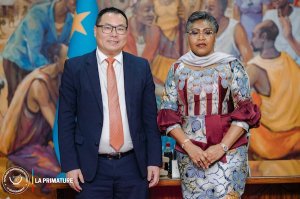Equipe Publication
DRCPass Digital ID Plan Priced at $97.1M, Financing Remains Unclear
Developing DRCPass, the national digital identification system for the Democratic Republic of Congo, requires $97.1 million in capital expenditure. These costs cover only the equipment, systems, infrastructure, and facilities needed for deployment, according to a Ministry of Planning document.
The project is structured as a public-private partnership signed in June 2025 between the Ministry of Posts, Telecommunications and New Information and Communication Technologies and the Singaporean company Trident Digital Tech Holdings Ltd. This agreement followed the validation of the proposal by the PPP Management Consulting and Coordination Unit (UC-PPP) a little over a month earlier. The deal makes Trident the exclusive provider of the country's electronic identification services (e-KYC), based on Web 3.0 technologies. The Ministry of Planning document indicates the partnership runs for a 20-year term.
At this stage, no communication from the government or Trident
There has been no communication from the government or Trident so far specifying whether the company must raise the full amount of funding for the partnership. In a press release issued on Sept. 16, 2025, Trident Digital Tech Holdings Ltd announced it had raised $2.6 million. The company said the funds would mainly support the expansion and commercialization of DRCPass in the DRC. Separately, President Félix Tshisekedi announced on Sept. 26, 2025, a $1 billion public investment under the National Digital Development Plan for the 2026-2030 period. This plan includes the rollout of a digital identity for citizens and residents.
The DRCPass system is built around four priority use cases. It is intended to enable biometric authentication for SIM cards linked to a blockchain-verified identity to reduce fake registrations and fraud risks. It will also provide easier access to e-government platforms and online services through a single identifier for all digital public services. For financial services, the system will integrate a one-click e-KYC solution with automated risk assessment and immediate access to credit services to strengthen financial inclusion. Finally, it will serve as a secure digital identity document for public and private transactions, as a complement to physical documents.
Timothée Manoke
Identification numérique : 97,1 millions $ d’investissements pour déployer le DRCPass
Pour développer le DRCPass, qui constitue le système national d’identification numérique de la RDC, les besoins en investissements (CAPEX) c’est-à-dire les dépenses strictement liées aux équipements, aux systèmes, aux infrastructures et aux installations nécessaires au déploiement s’élèvent à 97,1 millions de dollars, selon un document du ministère du Plan.
Ce projet fait l’objet d’un partenariat public-privé signé en juin 2025 entre le ministère des Postes, Télécommunications et Nouvelles technologies de l’information et de la communication et la société singapourienne Trident Digital Tech Holdings Ltd, un peu plus d’un mois après la validation du dossier par l’Unité de conseil et de coordination de la gestion des PPP (UC-PPP). L’accord attribue à Trident le rôle de fournisseur exclusif des services électroniques d’identification (e-KYC) de la République, fondés sur des technologies Web 3.0. Le document du ministère du Plan indique que le PPP porte sur une durée de vingt ans.
À ce stade, aucune communication du gouvernement ou de Trident ne précise si l’entreprise devra mobiliser l’intégralité du financement lié au PPP. Dans un communiqué publié le 16 septembre 2025, Trident Digital Tech Holdings Ltd a toutefois annoncé avoir levé 2,6 millions de dollars, précisant que ces fonds seraient principalement utilisés pour soutenir l’expansion et la commercialisation du DRCPass en RDC. Parallèlement, le président Félix Tshisekedi a annoncé, le 26 septembre 2025, un investissement public d’un milliard de dollars destiné au Plan national de développement du numérique pour la période 2026-2030, au sein duquel figure notamment la création d’une identité numérique pour les citoyens et résidents.
Le DRCPass repose sur quatre usages prioritaires. Il doit permettre l’authentification biométrique des cartes SIM, associée à une identité vérifiée par blockchain, dans l’objectif de réduire les lignes fictives et les risques de fraude. Il offrira également un accès simplifié aux plateformes d’e-gouvernement et aux services en ligne, grâce à un identifiant unique permettant la connexion à l’ensemble des services publics numériques. Sur le plan financier, le système intégrera une solution d’e-KYC en un clic, avec évaluation automatisée du risque et accès immédiat à des services de crédit afin de renforcer l’inclusion financière. Il servira enfin de pièce d’identité numérique sécurisée, complémentaire aux documents physiques, pour les transactions publiques et privées.
Timothée Manoke
Lire aussi :
Identification numérique : Trident lève 2,6 millions $ pour déployer le DRCPass
Numérique: Tshisekedi promet un milliard $ d’investissement public d’ici 2030
Alphamin Says Bisie Revenue Up In 2025 On Higher Prices And Output
Alphamin Resources Corp said tin production at its Bisie mine in North Kivu rose 7% year on year to 18,576 tonnes in the fiscal year ended Dec. 31, 2025.
Output was broadly in line with the company’s revised guidance of 18,000 to 18,500 tonnes, after operations were temporarily suspended in March 2025 for security reasons.
EBITDA rose 25% to $341.4 million in 2025 from $274.0 million in 2024, Alphamin said, citing higher volumes, the impact of extensions at Mpama South and a higher average selling price.
The company said current tin prices and stable output should support cash flow and could allow for higher dividends. It said it paid $123 million in dividends in 2025, or C$0.11 per share, compared with C$0.09 in 2024. It expects to decide on its next dividend in April 2026 after publishing audited accounts.
Tin prices were expected to rise about 10% in 2025 to $33,000 per tonne from $30,066 in 2024, according to World Bank projections. Tin hit a record high of around $53,460 per tonne on Jan. 14, market data showed, amid supply concerns including in Indonesia and Myanmar.
Targets 20,000 tonnes in 2026
In Indonesia, authorities announced an operation to shut about 1,000 illegal mining sites in Bangka Belitung, a move likely to tighten supply from informal channels. Indonesia accounts for roughly one-sixth of global tin mine production, according to international statistics.
In Myanmar, the Man Maw mine remains central to regional supply. Authorities in the Wa region have signalled a possible restart, but administrative delays and operational uncertainty have kept the market volatile.
While demand from electronics, soldering, packaging and chemicals, as well as electrification-related uses, continues to support prices, some analysts have pointed to the growing influence of financial factors. The International Tin Association (ITA) has warned that the market can become vulnerable to corrections when fund positioning is elevated, even when supply is disrupted.
For 2026, Alphamin targets production of about 20,000 tonnes, in line with its targeted annualised rate. The company said achieving that goal depends on uninterrupted operations, and noted a resurgence of security incidents in North Kivu. The mine is located away from the worst-affected areas, but the risk remains high and a deterioration could disrupt activity.
PM, with Ecofin Agency
Mine d’étain de Bisie : revenus en hausse en 2025, portés par les prix et la production
Exploitée par Alphamin Resources, la mine d’étain de Bisie (Nord-Kivu) affiche une production de 18 576 tonnes d’étain pour l’exercice clos au 31 décembre 2025, soit une hausse de 7 % sur un an. Cette performance est globalement conforme à sa guidance révisée (18 000 à 18 500 tonnes), après une suspension temporaire des opérations en mars 2025 pour des raisons de sécurité.
Sur le plan financier, le bénéfice avant intérêts, impôts, dépréciation et amortissement (EBITDA) est annoncé à 341,4 millions de dollars en 2025, en hausse de 25 % par rapport aux 274,0 millions de dollars enregistrés en 2024, grâce à l’augmentation des volumes, à l’effet des extensions (Mpama Sud) et à un prix moyen de vente en progression.
Alphamin estime que la combinaison du cours actuel de l’étain et de la stabilité de la production est « de bon augure » pour les flux de trésorerie et, potentiellement, pour la hausse des dividendes. En 2025, la société indique avoir versé 123 millions de dollars de dividendes, soit 0,11 dollar canadien par action (contre 0,09 en 2024). La prochaine décision sur les dividendes est attendue en avril 2026, après la publication des comptes audités.
Selon les données publiées par la compagnie, le prix moyen de l’étain a augmenté de 13% en 2025 à 34 388 dollars. Début 2026, l’étain a franchi un niveau historique autour de 53 460 dollars la tonne, le 14 janvier, selon des séries de marché largement reprises par les acteurs. Une partie du rallye s’explique par des inquiétudes sur l’offre, notamment en Indonésie et au Myanmar.
20 000 tonnes visées en 2026
En Indonésie, les autorités ont annoncé une opération visant à fermer environ 1 000 sites d’extraction illégale à Bangka Belitung, un élément susceptible de peser sur le flux d’approvisionnement informel. À l’échelle mondiale, l’Indonésie représente autour d’un sixième de la production minière d’étain (ordre de grandeur cohérent avec les statistiques internationales).
Au Myanmar, la mine de Man Maw un pivot de l’offre régionale reste au cœur des anticipations : les autorités de la région Wa ont multiplié les signaux de reprise, mais les modalités administratives et les incertitudes opérationnelles entretiennent la volatilité.
Si la demande structurelle (électronique/soudure, emballage, chimie, et nouveaux usages liés à l’électrification) soutient le métal, plusieurs analyses insistent sur le rôle croissant des facteurs financiers. L’International Tin Association (ITA) souligne que le marché peut devenir vulnérable à des corrections lorsque le positionnement des fonds atteint des niveaux élevés, même en présence de chocs d’offre.
Pour 2026, Alphamin vise une production d’environ 20 000 tonnes, un niveau correspondant à son rythme annualisé ciblé. Mais l’atteinte de cet objectif dépendra de la continuité des opérations. La société affirme observer une recrudescence d’incidents sécuritaires dans la province du Nord-Kivu : la mine est éloignée des zones les plus touchées, mais le profil de risque reste élevé et une dégradation pourrait perturber l’activité.
PM avec l’Agence Ecofin
Lire aussi :
Étain : hausse des prix jusqu’en 2027, mais la RDC reste à la marge de la valeur ajoutée
Kawtar Raji (ASMEX): “The DRC Is A Demanding Market That Takes Time To Build”
The Moroccan Confederation of Exporters (ASMEX), which represents over 600 companies, recently concluded a high-level trade mission to Kinshasa from December 15 to 17, 2025. This mission aimed to revitalize economic exchange between the Democratic Republic of Congo (DRC) and Morocco. This is a strategic priority because bilateral trade has remained sluggish and volatile, fluctuating between $37 million and $60 million in recent years.
In this exclusive interview, Kawtar Raji, Secretary General of ASMEX, outlines the mission’s core priorities. As a Moroccan attorney and co-founder of the law firm Gauvin & Raji, which has operated in the DRC since 2023, Raji also discusses the essential frameworks needed to turn "South-South" ambitions into tangible and long-term business ventures.
Bankable: From December 15 to 17, you led a diverse ASMEX delegation representing sectors such as engineering, agribusiness, and digital technology on a mission to the DRC. What were the specific objectives behind this initiative?
Kawtar Raji: I led this mission on behalf of the Moroccan Confederation of Exporters (ASMEX) as a first step in implementing the Memorandum of Understanding signed with the DRC’s National Investment Promotion Agency (ANAPI) in July 2023. The agreement sets out a framework to strengthen ties between Moroccan and Congolese business leaders by identifying opportunities, supporting companies, and organizing economic events.
The mission we carried out last December also underscores Morocco’s commitment to strengthening South-South cooperation, in line with the vision of His Majesty King Mohammed VI. Ultimately, we want to raise our economic partnership to match the long-standing friendship between Morocco and the DRC.
Despite the tight timetable ahead of the Africa Cup of Nations, we decided to proceed with the mission because we wanted to send a clear message to business communities in both countries. The message was clear. Both sides are determined to move forward together, expanding the presence of Moroccan companies in the DRC while welcoming Congolese businesses to Morocco in return.
This progress was made possible thanks to ANAPI’s strong support at every stage, from planning and logistics to arranging meetings with public authorities and key economic partners.
In that regard, this mission officially launched our partnership with ANAPI. Further missions will follow, with the aim of organizing a flagship event such as a major economic forum in 2026. We focused on sectors aligned with the DRC’s priorities and where ASMEX members are keen to explore the Congolese market. Going forward, we are working with ANAPI to identify additional strategic sectors beyond infrastructure and construction to include in upcoming missions.
After this first mission, what concrete indicators, whether contractual, relational, or institutional, show that the initiative was successful?
Several indicators point to encouraging early results from this mission. First, we received strong institutional support. We met with two ministers: His Excellency Julien Paluku Kahongya, Minister of Foreign Trade, and His Excellency Guylain Nyembo Mbwizya, Minister of Planning. Both reaffirmed the DRC’s commitment to supporting economic cooperation and to making trade between our two countries easier. For Moroccan business leaders, that message matters because it provides reassurance that the institutional environment is supportive and open to dialogue.
The Moroccan private sector is looking for long-term, sustainable partnerships that create value on both sides.
Second, the B2B meetings were well attended and highly productive. Many Congolese companies came to meet our exporters and showed strong interest. I am confident these discussions will translate into concrete outcomes.
Third, our cooperation with ANAPI continues to gain momentum. We plan to deepen this partnership through sector-focused B2B missions and by building a pipeline of investment and co-investment projects in the DRC. ASMEX can then help mobilize Moroccan investors around these opportunities. In addition, the Congolese Agency for Large Works (ACGT) presented several promising projects, particularly in infrastructure.
Ultimately, our goal is to build a strong and lasting partnership between Morocco and the DRC.
After the mission, do Congolese buyers see “Made in Morocco” as premium, or more as a competitively priced alternative for the local market?
That is a great question. We are still at an early stage, and both sides are in a market discovery phase. This will help us identify the most promising segments and clarify where Moroccan products fit in terms of price and quality.
Some exporters in our delegation are already active in the DRC and are looking to strengthen and expand their presence. However, most were visiting the market for the first time to build new business relationships. As these partnerships develop, we will be able to assess more clearly how our products and services align with local purchasing power and expectations.
From what you’ve said, you’re not just looking for short-term deals. Is the long-term objective to position Morocco as an industrial and technology partner for the DRC?
Exactly. The Moroccan private sector is looking for long-term, sustainable partnerships that create value on both sides. The vision set out by His Majesty King Mohammed VI is clear: Morocco must help build win-win cooperation across the African continent.
Intra-African trade is still relatively low, at around 15 percent. That is sharply different from regions such as Europe and Asia, where most trade happens within the region. The challenge for African businesses is to unlock this potential by building stronger commercial and industrial partnerships across borders.
I believe Morocco and the DRC can play a leading role in that effort, given their shared history, strategic position, and economic weight. This is also fully in line with the objectives of the African Continental Free Trade Area (AfCFTA).
What is the current legal framework for trade between Morocco and the DRC? And what needs to happen for trade to move under AfCFTA preferences?
In principle, trade between our two countries can qualify under the African Continental Free Trade Area (AfCFTA), provided both Morocco and the DRC have ratified the agreement and put in place their tariff concession schedules. The key issue is ensuring Moroccan and Congolese exporters can effectively benefit from these preferences while complying with rules of origin and the agreed tariff reduction timelines.
Just a few days before our arrival in the DRC, Morocco hosted a business forum on the AfCFTA. Several African ministers attended, including the Congolese Minister of Foreign Trade. Those discussions confirmed a shared commitment to accelerating regional integration through the AfCFTA framework.
There is sometimes a misunderstanding about the situation in the DRC, often linked to confusion about insecurity in the eastern part of the country. We need to reassure partners and clarify that while there is conflict, it is limited to one region, and most of the country continues to function normally.
That said, we cannot wait for every AfCFTA mechanism to be fully in place before expanding trade. We also discussed the option of a bilateral trade agreement with the Congolese Minister of Foreign Trade. A dedicated bilateral framework would send a strong signal and could deliver clearer and faster outcomes for businesses in both countries.
Since the ANAPI agreement was signed, several Moroccan companies, including major banks, have carried out exploratory visits. Yet concrete deals have been slow to follow. What is holding things back?
Unfortunately, there is sometimes a misunderstanding about the situation in the DRC, often linked to confusion about insecurity in the eastern part of the country. We need to reassure partners and clarify that while there is conflict, it is limited to one region, and most of the country continues to function normally.
Another factor is the absence of key bilateral agreements, particularly on double taxation and investment protection. These instruments would improve legal certainty for investors by complementing the existing Congolese legal framework, including the Investment Code. They would also send a strong signal and help accelerate decision-making. I am confident that trade and investment will increase once these frameworks are in place.
That said, ASMEX has not waited for these agreements to be finalized before taking action. We are on the ground to show Moroccan investors and exporters that real opportunities exist in the DRC, and that the market should be approached with a strategic, long-term perspective.
Do you know what is delaying the signing of these bilateral agreements?
Finalizing these agreements requires a meeting of the Morocco-DRC joint commission to finalize the terms. To our knowledge, the commission is expected to meet soon. That should allow both sides to complete a package of bilateral agreements, which would then be ready for signature by both heads of state.
The DRC has a population of more than 100 million, with growing food demand. How do you approach agribusiness, and do you see scope for joint ventures to produce locally?
Our approach is based on co-development. The DRC has enormous agricultural potential, particularly because of the scale of its arable land. By combining that with Moroccan expertise, agricultural inputs, and investment capacity, we can develop high-impact projects that strengthen food security and also supply regional markets.
This potential will be even stronger as legal and regulatory reforms move forward and the business climate continues to improve. That will create real opportunities for Moroccan investors, including joint ventures for local production.
Beyond mining, where do you see the biggest opportunities? Which sectors should Moroccan companies focus on?
Yes, opportunities go well beyond mining. I would highlight infrastructure and construction, including major urban development projects such as Kinshasa’s expansion. Moroccan companies have recognized expertise in these areas and can compete effectively alongside Chinese and Turkish firms.
Energy is another strategic sector. Morocco has long been committed to the energy transition and has strong experience in renewables. That expertise can be leveraged to support the DRC’s needs.
The healthcare and pharmaceutical sectors also offer significant potential, from improving access to care to building local capacity for medicine production and distribution, as well as upgrading hospital infrastructure.
Morocco also has extensive experience in banking and finance across Africa. Bank of Africa is already present in the DRC, and other institutions could follow to further strengthen the country’s financial sector.
The DRC is a demanding market that takes time to build, and it rewards those who are prepared to move forward cautiously.
Finally, Morocco has major industrial players and a strategic geographic position linking Europe, Africa, and the Americas, supported by an attractive network of free trade agreements. The objective is to develop Moroccan-Congolese joint ventures while also attracting international investors who can use Morocco as a base and then expand into the DRC.
Your firm, Gauvin & Raji, has been established in Kinshasa since 2023. What legal or strategic advice would you give to Moroccan companies looking to establish a long-term presence in the DRC?
First, identify a trusted local partner. While there is generally no legal requirement to partner with a local entity, except in certain areas such as subcontracting, understanding the local business environment, practices, and decision-making dynamics is essential to launching successfully.
Second, protect your partnership and your operations from day one. That means working with a law firm that can safeguard the investor’s interests. In a joint venture, for example, the articles of association and shareholders’ agreement must be carefully drafted. Each party’s rights should be clearly defined, and governance must be designed to avoid deadlock. Strong legal structuring is critical to reducing risk and ensuring long-term stability.
Our approach is to get involved early by connecting companies, identifying opportunities, and structuring joint ventures. We then provide ongoing legal support to help prevent disputes and secure investments over the long term.
The DRC is often described as a challenging business environment. As a legal professional based there since 2023, how do you assess the business climate today?
I follow developments closely, including the reforms already underway, those planned next, and the clear commitment to improving the business environment. A lawyer’s role is not only to identify legal risks, but also to manage them through the right contractual protections and governance structures.
For investors, the question is not only what still needs to improve, but how to take a long-term view and be part of the market’s transformation. There is real momentum, and it is reflected in improving economic indicators and sustained interest from international partners. The IMF, the African Development Bank, the World Bank, and other institutions have signaled continued confidence in the country. There is also a strategic agreement between the DRC and the United States that is currently being finalized.
The DRC is a demanding market that takes time to build, and it rewards those who are prepared to move forward cautiously.
Interview by Aboudi Ottou
Kawtar Raji (ASMEX) : « La RDC est un marché exigeant qui se construit dans le temps »
La Confédération marocaine des exportateurs (ASMEX), qui fédère plus de 600 entreprises, a mené une mission de prospection à Kinshasa du 15 au 17 décembre 2025 pour dynamiser les échanges économiques entre la RDC et le Maroc. Un objectif stratégique, alors que le commerce bilatéral demeure faible et volatil, oscillant entre 37 et 60 millions de dollars ces dernières années. Dans cet entretien, sa secrétaire générale, Kawtar Raji, détaille les priorités de cette démarche. Cofondatrice du cabinet Gauvin & Raji, présent en RDC depuis 2023, l’avocate marocaine revient également sur les conditions nécessaires pour transformer l’ambition Sud-Sud en projets concrets et durables.
Bankable : Du 15 au 17 décembre dernier, vous avez conduit une délégation diversifiée de l’ASMEX (ingénierie, agroalimentaire, technologie, digital…) en mission en RDC. Quels sont les objectifs précis de cette démarche ?
Kawtar Raji : Cette mission, que j’ai conduite au nom de la Confédération marocaine des exportateurs (ASMEX), s’inscrit d’abord dans le cadre du protocole d’accord que nous avons signé avec l’Agence nationale pour la promotion des investissements de la RDC (ANAPI) en juillet 2023. Ce protocole établit un cadre de coopération destiné à favoriser les échanges entre opérateurs économiques marocains et congolais, notamment à travers l’identification d’opportunités d’affaires, l’accompagnement des entreprises et l’organisation de rencontres économiques.
Notre mission de décembre dernier s’inscrit également dans la volonté du Maroc de renforcer la coopération Sud-Sud, conformément aux hautes orientations de Sa Majesté le Roi Mohammed VI. Enfin, c’est une façon de ramener nos échanges économiques à la hauteur de l’histoire d’amitié entre le Maroc et la RDC.
Nous avons tenu à organiser cette mission dans un calendrier un peu contraint — à la veille de la Coupe d’Afrique des Nations de Football — parce que nous voulions envoyer un signal clair aux milieux économiques des deux pays : celui d’une volonté partagée d’aller de l’avant ensemble, de renforcer la présence des opérateurs marocains en RDC et d’accueillir, réciproquement, les opérateurs congolais chez nous.
Cette volonté a pu se traduire concrètement grâce à la forte mobilisation de l’ANAPI et l’excellent accompagnement de ses équipes sur l’ensemble des aspects : planification, mise en relation avec les autorités et partenaires économiques, logistique, etc.
Dans cette logique, cette mission marque le début de la mise en œuvre de notre partenariat avec l’ANAPI. D’autres missions suivront, avec l’objectif d’organiser quelque chose de plus ambitieux, comme un forum économique en 2026.
Nous avons ciblé des secteurs présentant un réel intérêt pour la RDC et pour lesquels des membres de l’ASMEX ont exprimé une volonté d’explorer le marché congolais. Nous travaillons avec l’ANAPI à l’identification d’autres secteurs stratégiques en plus des infrastructures et du BTP, qui seront représentés dans les prochaines missions.
Bankable : À l’issue de cette première mission, quels indicateurs — contractuels, relationnels ou institutionnels — permettent de considérer que cette initiative est une réussite ?
KR : Plusieurs indicateurs permettent d’apprécier les premiers résultats de cette mission. D’abord, l’expression d’un appui institutionnel clair: nous avons eu le privilège d’être reçus par deux ministres — le ministre du Commerce extérieur, son excellence, monsieur Julien Paluku Kahongya et le ministre du Plan, son excellence monsieur Guylain Nyembo Mbwizya — qui ont exprimé, du côté congolais, la volonté d’accompagner les initiatives économiques et de travailler à la fluidification des échanges entre nos deux pays. Pour les opérateurs marocains, c’est un message important en ce qu’il rassure sur l’existence d’un environnement institutionnel attentif et ouvert au dialogue.
Deuxième indicateur : la forte mobilisation et la réussite de la journée B2B. Il y a eu une forte présence d’opérateurs économiques, venus à la rencontre de nos exportateurs et qui ont manifesté un intérêt. J’ose croire qu’après ces échanges, il y aura des résultats concrets.
Enfin, il y a la dynamique engagée avec l’ANAPI, que nous voulons poursuivre et renforcer non seulement à travers des missions B2B sectorielles mais également à travers l’identification d’un pipeline de projets d’investissement et de co-investissement en RDC sur lesquels, en tant qu’ASMEX, nous pourrons mobiliser des investisseurs marocains. L’Agence congolaise des grands travaux (ACGT) nous a, par ailleurs, présenté des opportunités intéressantes, notamment en matière d’infrastructures.
L’objectif est de contribuer à la construction d’un partenariat solide et durable entre deux grands pays : le Maroc et la RDC.
Bankable : Après votre mission, comment qualifiez-vous l’accueil réservé aux produits et services marocains ? Le “Made in Morocco” est-il perçu comme une offre premium, ou comme une solution adaptée au pouvoir d’achat local ?
KR : La question est pertinente. Nous sommes au début d’une dynamique d’exploration mutuelle, qui permettra d’identifier les segments de marché les plus pertinents et de mesurer le positionnement prix/qualité.
Le secteur privé marocain cherche des opportunités de long terme, durables et mutuellement bénéfiques. Les orientations de Sa Majesté sont claires : construire des partenariats gagnant-gagnant à l’échelle africaine.
Parmi les exportateurs présents dans notre mission, certains travaillent déjà avec la RDC et exportent sur ce marché : ils sont dans une logique de consolidation et de renforcement de leurs parts. La plupart, en revanche, découvrait le marché pour la première fois, avec l’objectif de nouer des relations d’affaires. La question de l’adéquation de nos produits au pouvoir d’achat pourra donc être appréciée ultérieurement.
Bankable : À vous écouter, il ne s’agit pas de se limiter aux opportunités de court terme : l’objectif est de positionner durablement le Maroc comme partenaire industriel et technologique de référence pour la RDC. C’est bien cela ?
KR : Tout à fait. Le secteur privé marocain cherche des opportunités de long terme, durables et mutuellement bénéfiques. Les orientations de Sa Majesté sont claires : construire des partenariats gagnant-gagnant à l’échelle africaine.
Il est aujourd’hui largement admis que les échanges intra-africains demeurent limités, aux alentours de 15%, alors même que dans d’autres régions du monde comme l’Europe ou l’Asie, l’essentiel des échanges commerciaux se fait à l’intérieur même du continent. L’enjeux pour les opérateurs économiques africains est de tirer parti de ce potentiel inexploité notamment en se positionnant comme partenaires commerciaux et industriels de confiance.
Je pense que la RDC et le Maroc peuvent par l’histoire, la géostratégie et le poids économique jouer un rôle moteur au service d’une intégration économique africaine plus aboutie. C’est précisément l’esprit dans lequel s’inscrit la Zone de libre-échange continentale africaine (ZLECAf).
Bankable : Les échanges entre la RDC et le Maroc se font dans quel cadre juridique ? Et que faudrait-il faire pour basculer sur la couverture de la ZLECAf ?
KR : Les échanges commerciaux entre les deux pays peuvent en principe s’inscrire dans le cadre de l’accord portant création de la ZLECAF signé en 2018 dès lors que les deux pays ont ratifié ledit accord et ont adopté leurs listes réciproques de concessions tarifaires. L’idée est de voir comment les exportateurs marocains et congolais peuvent bénéficier de ces listes, en tenant compte des règles d’origine et des calendriers de démantèlement.
Quelques jours avant notre venue en RDC, un forum d’affaires sur la ZLECAf s’est tenu au Maroc, en présence de plusieurs ministres africains dont le ministre congolais du Commerce extérieur. Les échanges ont confirmé une volonté commune d’accélérer l’intégration régionale dans le cadre de la ZLECAf.
Cela étant, nous ne pouvons pas attendre que la ZLECAf soit pleinement opérationnelle pour développer les échanges. La possibilité de signer un accord commercial bilatéral a été évoquée avec le ministre congolais du Commerce extérieur. Ce serait un bon signal : un cadre bilatéral spécifique pourrait apporter des réponses plus rapides et plus lisibles aux opérateurs économiques.
Bankable : Depuis la signature de l’accord avec l’ANAPI, des entreprises marocaines sont venues en prospection, y compris de grandes banques. Mais les choses prennent du temps à se concrétiser. Qu’est-ce qui l’explique ?
KR : Il existe malheureusement une perception parfois biaisée de la réalité en RDC, avec une confusion liée à ce qui se passe à l’Est du pays. Cela nous oblige à rassurer et à expliquer que le conflit est circonscrit à une partie du territoire, tandis que le reste du pays vit normalement.
Par ailleurs, l’absence d’accords bilatéraux — non double imposition, protection des investissements, etc. — n’aide pas non plus. Ces accords contribueraient à renforcer la sécurité juridique des investissements, en complétant le cadre offert par le droit congolais notamment le Code des investissements, et en envoyant un signal de confiance supplémentaire aux investisseurs. Je suis convaincue que, dès qu’ils seront en place, les flux d’affaires augmenteront.
L’ASMEX n’a pas attendu la conclusion de ces accords pour agir. Nous sommes présents pour démontrer aux investisseurs et exportateurs marocains qu’il existe de réelles opportunités en RDC, et que ce marché mérite d’être appréhendé dans une logique stratégique de long terme.
Bankable : Savez-vous ce qui retarde la signature de ces accords bilatéraux ?
KR : La conclusion de ces accords nécessite la réunion d’une commission mixte bilatérale Maroc-RDC chargée d’en finaliser les termes. Selon les informations dont nous disposons, la commission devrait se réunir prochainement et permettre l’aboutissement d’un ensemble conséquent d’accords bilatéraux, préalablement à leur signature par les deux chefs d’État.
Bankable : La RDC, c’est plus de 100 millions de personnes à nourrir. Quelle est votre approche sur l’agroalimentaire ? Est-il possible de développer des co-entreprises pour produire localement ?
KR : Nous privilégions l’approche du co-développement. La RDC dispose d’un potentiel agricole considérable, notamment en terres arables. En combinant ce potentiel avec le savoir-faire marocain, les intrants et les capacités d’investissements, nous pouvons développer des projets structurants au service de l’autosuffisance alimentaire et de l’approvisionnement des marchés régionaux.
Mon premier conseil est d’identifier un partenaire local de confiance. Même s’il n’y a pas d’obligation générale de s’associer à un partenaire local — hormis dans certains domaines comme la sous-traitance —la connaissance du terrain, des usages et des dynamiques locales est déterminante pour réussir une implantation locale.
Cette dynamique pourra se renforcer, au rythme des réformes légales et réglementaires engagées et de l’amélioration progressive du climat des affaires, ce qui pourra ouvrir des perspectives concrètes pour les investisseurs marocains.
Bankable : Avez-vous identifié des opportunités en dehors des mines ? Dans quels secteurs les entreprises marocaines devraient-elles regarder en priorité ?
KR : Oui, les opportunités dépassent le seul secteur minier. Je pense aux infrastructures et au BTP, avec des projets d’envergure, dont l’extension de Kinshasa. Des entreprises marocaines disposent d’un savoir-faire reconnu dans ces domaines et peuvent légitimement se positionner aux côtés des acteurs chinois et turcs.
Le secteur de l’énergie est également stratégique. Le Maroc, engagé de longue date dans la transition énergétique, dispose d’une expertise solide en énergies renouvelables. Cette expertise peut être mobilisée pour accompagner la RDC.
Les secteurs médical et pharmaceutique offrent eux aussi un potentiel important. Il s’agit à la fois de renforcer l’accès aux soins, de développer des capacités locales de production ou de distribution de médicaments et d’améliorer les infrastructures hospitalières.
Par ailleurs, le Maroc a une expérience importante en banque-finance sur le continent. Bank of Africa est déjà présente en RDC, mais d’autres institutions pourraient venir renforcer l’écosystème financier du pays.
Enfin, le Maroc dispose de champions industriels et d’un positionnement stratégique au carrefour de l’Europe, l’Afrique, et l’Amérique, ainsi que d’un réseau d’accords de libre-échange attractif. L’idée est de développer des joint-ventures maroco-congolaises, mais aussi d’attirer des investisseurs internationaux qui pourront s’implanter d’abord au Maroc, puis en RDC.
Bankable : Votre cabinet, Gauvin & Raji, est implanté à Kinshasa depuis 2023. Quel réflexe juridique ou stratégique recommanderiez-vous aux entreprises marocaines souhaitant s’implanter durablement en RDC ?
KR : Mon premier conseil est d’identifier un partenaire local de confiance. Même s’il n’y a pas d’obligation générale de s’associer à un partenaire local — hormis dans certains domaines comme la sous-traitance —la connaissance du terrain, des usages et des dynamiques locales est déterminante pour réussir une implantation locale.
Deuxième conseil : sécuriser en amont son partenariat et son activité. cela suppose de se faire accompagner par un cabinet d’avocats capable de défendre efficacement les intérêts de l’investisseur. En cas de joint-venture par exemple, les statuts et le pacte d’associés doivent être soigneusement rédigés, les droits des parties bien définis, et la gouvernance conçue de manière à éviter les blocages. La structuration juridique est fondamentale pour rassurer l’investisseur.
Notre approche consiste à intervenir en amont, en rapprochant les opérateurs, en identifiant les opportunités, en structurant notamment des joint-ventures puis en accompagnant les projets dans la durée, afin d’éviter les contentieux et sécuriser les investissements sur le long terme.
Bankable : Le climat des affaires est souvent présenté comme complexe en RDC. Quel est votre regard, en tant que juriste installée depuis 2023 ?
KR : Je suis attentive à la trajectoire du pays : les réformes déjà entamées, celles envisagées, et surtout la volonté d’améliorer le climat des affaires. Le rôle de l’avocat est non seulement d’identifier les défis juridiques, mais aussi de les traiter par des mécanismes contractuels adaptés.
Pour un investisseur, il ne s’agit pas seulement de constater ce qui peut encore être amélioré mais de s’inscrire dans la dynamique de transformation. Cette dynamique est réelle et positive. Cela se reflète dans l’évolution des indicateurs du pays et dans l’intérêt soutenu des partenaires internationaux. Le FMI, la BAD, la Banque mondiale et d’autres institutions font confiance au pays. Il y a aussi un accord stratégique entre la RDC et les États-Unis, en cours de finalisation. La RDC est un marché exigeant qui se construit dans le temps, pour des acteurs prêts à avancer avec prudence.
Interview réalisée par Aboudi Ottou
Lire aussi :
Climat des affaires : les services publics, talon d’Achille de la RDC
Révision du code des investissements : les travaux lancés à Kinshasa
PPP : Kinshasa veut arrimer sa loi aux standards internationaux
Foncier : un nouveau projet de loi pour sécuriser les terres et numériser le cadastre en RDC
Minerais critiques, sécurité, fiscalité… : ce que prévoit l’accord RDC–États-Unis
DRC Gets S&P Outlook Boost Ahead of Planned $750 Million Eurobond
S&P Global Ratings on Jan. 23 raised its outlook on the Democratic Republic of Congo to positive from stable and affirmed the country’s long-term sovereign rating at B- and its short-term rating at B in both foreign and local currency.
A sovereign rating signals a government’s creditworthiness. The positive outlook indicates the rating could be upgraded if economic and fiscal trends continue to improve. S&P said the revision reflects expectations that the DRC will sustain strong growth, build foreign exchange reserves and improve tax collection through ongoing fiscal reforms, citing progress on both the fiscal and external fronts.
S&P and the International Monetary Fund expect growth to remain above 5% between 2026 and 2028. Government revenue is expected to rise slightly faster than nominal GDP. S&P also pointed to a rebound in foreign exchange reserves, which reached about $7.9 billion at end-December 2025 (around three months of import cover), up from less than one month in 2021.
The agency highlighted tax reforms, including a standardised invoicing system launched in December 2025 to support VAT collection, as well as steps to curb exemptions and subsidies. These measures aim to keep revenue at 14% to 15% of GDP, up from an average of about 11% over the past decade. They are also intended to reduce the state’s reliance on mining, which accounts for more than 40% of government revenue and has driven recent gains in receipts.
Structural vulnerabilities
The outlook change comes as the DRC prepares to tap international debt markets this year, with plans to raise $750 million in its first Eurobond issue. Finance Minister Doudou Fwamba Likunde said the outlook revision and rating affirmation would bolster investor confidence ahead of the planned sale.
However, the positive outlook is unlikely to remove the premium investors typically demand from first-time speculative-grade issuers. Bloomberg said yields could approach double digits depending on the bond’s maturity, citing the 13.7% yield paid by neighbouring Republic of Congo last year.
S&P said the DRC still faces structural vulnerabilities, including dependence on mining, weak institutions and persistent insecurity in the east, which adds to public spending and weighs on investment.
S&P said it could raise the rating if net reserves increase further and fiscal deficits narrow. It added that an upgrade would also require clearer signs of economic diversification and a broader government revenue base.
Pierre Mukoko
Eurobond : le coup de pouce de Standard & Poor’s à la RDC
Standard & Poor’s Global Ratings (S&P) a relevé, le 23 janvier 2026, la perspective de la République démocratique du Congo (RDC) de « stable » à « positive » et a confirmé ses notations souveraines « B- » à long terme et « B » à court terme, en devises comme en monnaie locale.
La notation souveraine est un indicateur donné aux prêteurs sur le risque encouru en accordant un prêt à un pays. La perspective positive indique que cette notation pourrait s’améliorer à l’avenir, signe d’une confiance dans les projections macroéconomiques du pays. « La perspective positive repose sur notre attente que la RDC maintiendra une croissance robuste, accumulera des réserves en devises et améliorera la collecte des impôts grâce aux réformes budgétaires en cours », indique d’ailleurs S&P, qui relie son optimisme à des progrès budgétaires et externes.
Comme le Fonds monétaire international (FMI), S&P estime que la croissance devrait rester au-dessus de 5 % entre 2026 et 2028 et que les recettes publiques progresseraient un peu plus vite que le PIB nominal. Elle souligne aussi le redressement des réserves en devises, qui ont atteint environ 7,9 milliards de dollars fin décembre 2025, équivalentes à environ trois mois d’importations, contre moins d’un mois en 2021.
L’agence met également en avant des réformes fiscales, dont la facturation normalisée lancée en décembre 2025 pour soutenir la collecte de la TVA, et des mesures visant à limiter certaines exonérations et subventions. Ces réformes visent à maintenir les recettes à 14 %–15 % du PIB — une amélioration significative par rapport à la moyenne d’environ 11 % observée au cours de la décennie précédente — et à décorréler partiellement les finances publiques du secteur minier, qui génère plus de 40 % des recettes de l’État et a été le principal moteur de la croissance des recettes ces dernières années.
Vulnérabilités structurelles
Cette inflexion est perçue comme un signal utile alors que la RDC prépare, cette année, son entrée sur le marché international de la dette, en vue de lever 750 millions de dollars via sa première émission d’eurobond. « L’affirmation de notre notation souveraine et la révision de la perspective à la hausse sont des développements importants pour renforcer la confiance des investisseurs alors que nous nous préparons à accéder aux marchés financiers internationaux au cours de cette année », a commenté le ministre des Finances, Doudou Fwamba Likunde, dans un communiqué publié par ses services.
Pour autant, la perspective « positive » n’efface pas les primes de risque attendues pour un primo-émetteur noté en catégorie spéculative. Bloomberg relève que des investisseurs pourraient exiger un rendement approchant les deux chiffres, selon la maturité des titres, et évoque même le taux de 13,7 % appliqué au Congo voisin l’année dernière.
Il faut dire que, comme le souligne S&P, la RDC reste affectée par des vulnérabilités structurelles : dépendance au secteur minier, faiblesses institutionnelles et insécurité persistante à l’Est, qui alourdit la dépense publique et décourage l’investissement.
Face à cette situation, l’agence conditionne un relèvement de la notation de la RDC — qui enverrait un signal encore plus positif aux investisseurs — à une nouvelle augmentation des réserves nettes, à une réduction des déficits budgétaires par rapport aux niveaux actuels et à l’existence de « signes clairs d’une diversification de l’économie et de la base de recettes de l’État ».
Pierre Mukoko
Lire aussi :
Eurobond : la RDC réduit de moitié l’objectif de sa première émission à 750 millions $
DRC PM Meets China’s LiuGong To Discuss Possible Local Operations
Democratic Republic of Congo Prime Minister Judith Suminwa Tuluka met a delegation from Chinese construction equipment maker LiuGong at her office, according to a statement dated Jan. 22, 2026, published by the prime minister’s office. The statement described LiuGong as a global leader in construction machinery and said the talks were in line with the government’s push to improve the investment climate and attract industrial projects.
The prime minister’s office said discussions focused on a phased plan that could include setting up sales, assembly and maintenance facilities, alongside technology transfer and training for local workers. It also mentioned the possibility of local “Made in DRC” production, job creation and support for infrastructure development. The statement did not provide a timeline, locations, the size of the investment or the legal structure of the project, such as a subsidiary, partnership or joint venture.
Founded in 1958, LiuGong manufactures construction equipment including loaders, excavators, bulldozers and graders, as well as machinery used for roadworks and construction sites. On its website, the company says it operates internationally through a network of dealers.
Public information remains limited to the announcement of talks and broad areas of cooperation, including sales, assembly, maintenance, training and local production. Concrete details would require formal agreements, a timeline and quantified commitments.
Boaz Kabeya
Équipements de construction : le groupe chinois LiuGong envisage une implantation en RDC
La Première ministre Judith Suminwa Tuluka a reçu, à la Primature, une délégation de la firme chinoise LiuGong, « venue échanger sur les modalités de son implantation en RDC », selon une communication datée du 22 janvier 2026 et publiée par la Primature. Dans ce message, l’institution présente LiuGong comme un « leader mondial des équipements de construction » et situe cette démarche dans la politique du gouvernement visant à renforcer l’attractivité économique du pays et à attirer des investissements industriels.
Toujours selon la Primature, les échanges ont porté sur une implantation « progressive », articulée autour de plusieurs axes : l’installation d’unités de vente, d’assemblage et de maintenance ; un transfert de technologies et le renforcement des compétences locales ; des perspectives de production locale « Made in DRC » ; la création d’emplois ; ainsi qu’un appui au développement des infrastructures. À ce stade, la communication officielle ne précise ni le calendrier, ni les sites envisagés, ni le montant de l’investissement, ni le schéma juridique (filiale, partenariat, joint-venture) du projet.
LiuGong est un fabricant chinois d’équipements de construction, fondé en 1958. Le groupe propose une gamme d’engins couvrant notamment les chargeuses, les excavatrices, les bulldozers, les niveleuses et des équipements pour les travaux routiers et de chantier. Sur son site institutionnel, l’entreprise indique opérer à l’échelle internationale, avec une présence commerciale portée par un réseau de concessionnaires.
En l’état des informations publiques, le dossier se limite donc à un signal politique et à des orientations présentées par la Primature : l’annonce d’échanges sur les modalités d’implantation et l’énumération de pistes (vente, assemblage, maintenance, formation et production locale), dont les paramètres concrets restent à documenter à travers des accords formels, un calendrier et des engagements chiffrés.
Boaz Kabeya














